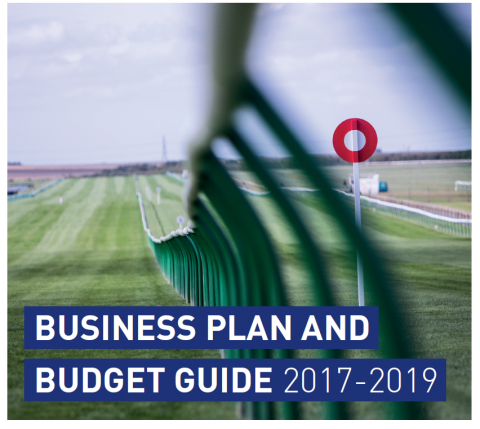The British Horseracing Authority (BHA) has today published a business plan and budget guide covering the three-year period 2017-2019.
Approved by the BHA Board, the business plan provides greater certainty to participants as to the level of future fees and shows where their fees are being directed over the next three years.
Headlines from the business plan and budget guide include:
- The agreed budget has been designed to break-even over a three-year period, with the BHA’s cash reserves remaining between £3 million and £4 million
- The budget includes annual savings of £1.1 million to be made by the BHA by 2019, and an increase in fees of 7.5% spread over three years
- Recognising the short-term financial uncertainty faced by the sport in 2017 before racing gets access to funds from the Levy replacement, fee increases will be phased-in and will increase by the lower rate of 2% in 2017, rising by 2.75% in 2018 and 2.75% in 2019.
The BHA’s Business Plan and Budget Guide 2017-2019 can be downloaded by clicking on the below image:

Nick Rust, Chief Executive of the BHA, said:
“We’ve set a budget that will enable the BHA to deliver more for our sport while phasing in fee changes over a three year period and keeping increases to an absolute minimum.”
“I appreciate that any increase is unwelcome and that our sport’s participants are yet to see the benefit of increased funding from the Levy. That’s why we’re committed to delivering total annual savings of £1.1 million in the BHA’s budget by 2019 and are limiting the increase in fees in 2017 to 2%.”
The BHA’s budget for 2016 was forecast to deliver a cash deficit of £770,000. Despite incurring additional costs in some areas, it is likely that the actual deficit will be better than forecast, somewhere in the region of £600,000.
This has been achieved through improved income performance, making savings in people and project costs, and by securing increased output from suppliers at no additional cost. Savings have been partly offset by increases in legal and professional fees relating to setting up the new Racing Authority and costs associated with some of the important integrity issues we have been dealing with this year.
The agreed budget will enable the BHA to break-even while delivering a number of essential new initiatives including:
- Setting up the new Racing Authority to take control of future Levy income
- Developing and implementing a new equine welfare strategy
- Increasing the volume of horse testing to keep our sport fair and clean
- Addressing industry staffing challenges including recruitment, training and welfare initiatives
- Making important changes to our disciplinary panels and processes following our Integrity Review and Christopher Quinlan QC’s review of the structure and composition of our Disciplinary Panel, Appeal Board and Licensing Committee.
- Expanding our Government relations to focus on racing’s significant economic footprint, including jobs and rural businesses, education and welfare
- Establishing a leadership role in UK sport and international racing in areas of anti-doping and sports governance.
Nick Rust added:
“Balancing increased activity with continued efficiency will enable us to deliver more for our sport while continuing to manage our budget prudently.”
“Despite having a three-year plan, the BHA’s performance will remain subject to an annual review, enabling our members and stakeholders to hold us to account for both our delivery and financial management.”
Notes to Editors:
1. To download the Business Plan and Budget Guide please click here.
2. The BHA’s strategic objectives are:
1. Equine welfare leadership: To provide equine welfare leadership.
2. Sustainable industry funding: To deliver improved and sustainable funding from betting on the sport.
3. Keeping racing fair and clean: To continue to evolve a regulatory and integrity framework that ensures improved confidence amongst participants and the racing and betting public.
4. Growing British racing together: To work with others in the sport to increase participation levels and deliver growth for the industry.
5. Competitive and compelling racing: To integrate the distribution of funding via the Racing Authority with the sport’s wider objectives for the fixture list and race programme.
6. Looking after our people: To develop properly funded and integrated industry training, welfare and careers marketing activities.
7. Professional workplace: To support the creation and maintenance of a friendly, productive and professional workplace, with an engaged workforce that is capable of contributing to the present and future success of the business.
8. World class racing: To continue to develop a framework that sees Britain further its position as the home of the best quality racing in the world.
9. Financial responsibility: To operate the BHA on a break-even basis over the medium-term whilst maintaining an appropriate level of cash reserves.
